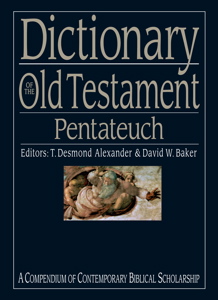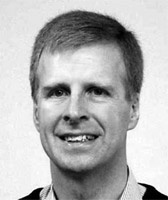Dictionary of the Old Testament: Pentateuch
 T. Desmond Alexander and David W. Baker, eds., Dictionary of the Old Testament: Pentateuch, A Compendium of Contemporary Biblical Scholarship series (InterVarsity Press, 2003) 954 pages, ISBN 9780830817818.
T. Desmond Alexander and David W. Baker, eds., Dictionary of the Old Testament: Pentateuch, A Compendium of Contemporary Biblical Scholarship series (InterVarsity Press, 2003) 954 pages, ISBN 9780830817818.
As an avid reader and owner of IVP’s New Testament Dictionaries (Dictionary of Biblical Imagery, Dictionary of Jesus and the Gospels, Dictionary of New Testament Background, Dictionary of Paul and His Letters, Dictionary of the Later New Testament and its Development; all but the first being ECPA Gold Medallion winners), I was delighted to see they had begun the same series on the Old Testament. A casual reading found that this massive volume covers topics ranging from “Aaron” to “Zoology” including such subjects as “Blessings and Curses,” “Flood,” “Honor and Shame,” and “Sacrifices and Offerings.” Each of these topics are presented as they relate the Pentateuch, the first five books of the Bible.
Wanting to investigate further it was decided to start by finding out who the Dictionary claims is the author (or authors) of the Pentateuch. The first article referenced was “Authorship of the Pentateuch” a 12 page article that does not state that Moses did write the first five books of the Bible, neither does it state he did not. The article leaves the conclusion up to the reader based on the evidence presented. The reader is then referred to comparative articles on “Form Criticism,” “Historical Criticism,” “Pentateuchal Criticism, History of,” “Source Criticism,” and “Writing” which consume a total of 49 pages without every taking a stand on the issue of Mosaic authorship.
Next, an article of Pentecostal/Charismatic beliefs was chosen, “Signs and Wonders.” The subject was presented with a watered down view of the miraculous in two basic ways. First, the article allowed that the signs and wonders of the Pentateuch occurred as natural events but attributed to God. This disregards the passages in which Moses pre-announced the plagues before they took place. Second, the signs and wonders of the Pentateuch are examined in light of Documentary Hypothesis, or the JEDP theory of multiple authors of the Pentateuch over hundreds of years. This method opens the door to the possibility that the signs and wonders were later added to the events instead of actually taking place.
This is not to say that the Dictionary is without merit. The article on “God, Names of” was very rewarding. Three prominent names of God were presented. The first name discussed was El meaning “power,” “creator,” “maker” as well as the plural form Elohim. The second major name of God presented is Yahweh, the personal name for God. The article explains how the name Yahweh is used when God is describing a personal relationship with his people, when grace is involved, when his commitment to his people is established, and when his jealousy is aroused. The third major name discussed is Adonay which means “lord” or “master.” Adonay is used much less frequently in the Pentateuch than the other two names of God, but more so later on during the time of the Second Temple. Other less frequently used names of God are also discussed but in much less detail.
Category: Biblical Studies, Winter 2004



